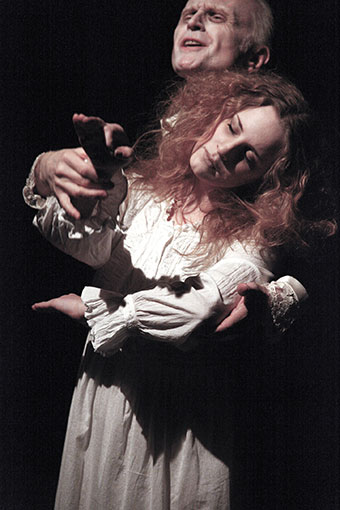Fall of the House of Usher
by Anthony Chase

Steven Berkoff is kind of a scary guy, known for playing heavies on stage and in film and for his adaptations and direction of psychologically complex stories. Kafka is a favorite of his. Torn Space, in association with the Irish Classical Theatre, is currently presenting his adaptation of Edgar Allen Poe’s The Fall of the House of Usher, directed by Vincent O’Neill.
The script is notable for its fairly faithful adherence to Poe’s story about the ailing Usher twins, brother and sister, who live a troubled life in a decaying house so closely associated with the family that the people of the town call the building itself “Usher.” A prototype of the gothic style, a nameless narrator (given the name Edgar in Berkoff’s version) pays a visit at the urgent pleading of his boyhood friend, Roderick Usher. Despite their childhood intimacy, it turns out that Edgar hardly knows Roderick at all.
David Oliver plays Roderick. Cassie Gorniewicz is Madeline. Andrew Kottler plays Edgar and briefly doubles as a household servant.
The Usher estate is a dark and spooky place with a crack running from roof to the basement—a detail that will become important, as every detail in the story will prove to be. Roderick seems listless and unwell, and his sister, Madeline, is dying. The eventual “death” of Madeline proves to be the pivotal turn of the plot, as Roderick enlists Edgar to place his twin sister in her tomb, resulting in the ultimate Poe reversal.
The production, with set by Greg Faust, lends the proceedings the required air of mystery and gloom. The pace is slow to the point of being ceremonial, almost like Noh drama, as it progresses through the events of Poe’s macabre tale.
The famous vagueness of The Fall of the House of Usher, in terms of its grasp of place and time or our sense of what we are doing there, lends itself brilliantly to the Torn Space style. Artistic director Daniel Shanahan has often employed these elements in his own scripts—Area, Stivale, etc.—which fetishistically visit moments in the lives of ambiguous characters, leaving audiences to contemplate whether we are watching someone’s delusions, dreams, or horrible reality.
blog comments powered by Disqus|
Issue Navigation> Issue Index > v10n7 (Week of Thursday, February 17) > Theater Week > Fall of the House of Usher This Week's Issue • Artvoice Daily • Artvoice TV • Events Calendar • Classifieds |









 Current Issue
Current Issue